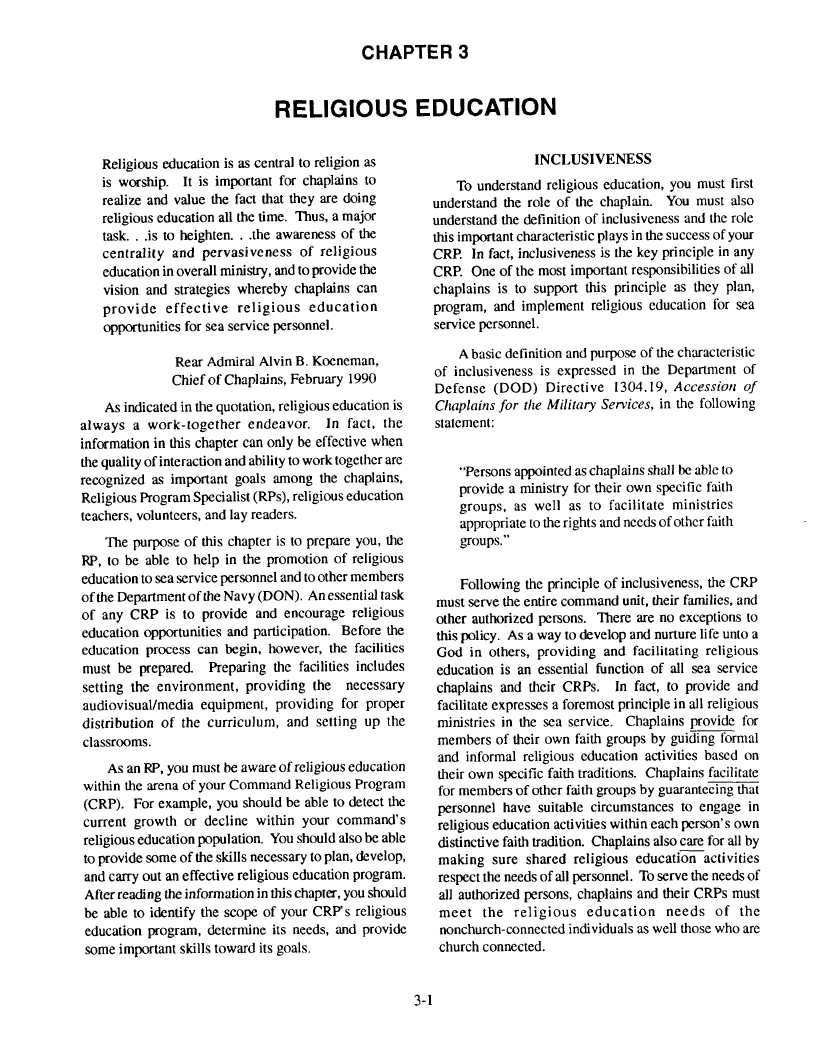CHAPTER 3
RELIGIOUS EDUCATION
Religious education is as central to religion as
is worship.
It is important for chaplains to
realize and value the fact that they are doing
religious education all the time. Thus, a major
task .. .is to heighten. .. the awareness of the
centrality
and pervasiveness
of religious
education in overall ministry, and to provide the
vision and strategies whereby chaplains can
provide
effective
religious
education
opportunities for sea service personnel.
Rear Admiral Alvin B. Koeneman,
Chief of Chaplains, February 1990
As indicated in the quotation, religious education is
always
a work-together
endeavor.
In fact,
the
information in this chapter can only be effective when
the quality of interaction and ability to work together are
recognized
as important goals among the chaplains,
Religious Program Specialist (RPs), religious education
teachers, volunteers, and lay readers.
The purpose of this chapter is to prepare you, the
RP, to be able to help in the promotion of religious
education to sea service personnel and to other members
of the Department of the Navy (DON). An essential task
of any CRP is to provide
and encourage
religious
education opportunities and participation.
Before the
education process can begin, however, the facilities
must be prepared.
Preparing the facilities includes
setting the environment,
providing
the
necessary
audiovisual/media
equipment,
providing
for proper
distribution
of the curriculum,
and setting up the
classrooms.
As an RP, you must be aware of religious education
within the arena of your Command Religious Program
(CRP).
For example, you should be able to detect the
current growth or decline
within your commands
religious education population. You should also be able
to provide some of the skills necessary to plan, develop,
and carry out an effective religious education program.
After reading the information in this chapter, you should
be able to identify the scope of your CRP’s religious
education program, determine its needs, and provide
some important skills toward its goals.
INCLUSIVENESS
To understand religious education, you must first
understand the role of the chaplain.
You must also
understand the definition of inclusiveness and the role
this important characteristic plays in the success of your
CRF. In fact, inclusiveness is the key principle in any
CRP. One of the most important responsibilities of all
chaplains is to support this principle as they plan,
program, and implement religious education for sea
service personnel.
A basic definition and purpose of the characteristic
of inclusiveness
is expressed
in the Department of
Defense
(DOD)
Directive
1304.19,
Accession
of
Chaplains for the Military Services, in the following
statement:
“Persons appointed as chaplains shall be able to
provide a ministry for their own specific faith
groups,
as well as to facilitate
ministries
appropriate to the rights and needs of other faith
groups.”
Following the principle of inclusiveness, the CRP
must serve the entire command unit, their families, and
other authorized persons.
There are no exceptions to
this policy. As a way to develop and nurture life unto a
God in others, providing
and facilitating
religious
education is an essential function of all sea service
chaplains and their CRPs.
In fact, to provide and
facilitate expresses a foremost principle in all religious
ministries in the sea service.
Chaplains provide for
members of their own faith groups by guiding formal
and informal religious education activities based on
their own specific faith traditions. Chaplains facilitate
for members of other faith groups by guaranteeing that
personnel have suitable circumstances
to engage in
religious education activities within each person’s own
distinctive faith tradition. Chaplains also care for all by
making
sure shared religious
education activities
respect the needs of all personnel. To serve the needs of
all authorized persons, chaplains and their CRPs must
meet
the
religious
education
needs
of
the
nonchurch-connected
individuals as well those who are
church connected.
3-1


